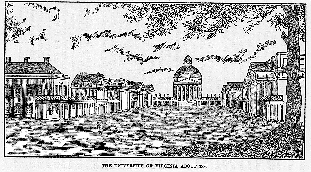ramble among the outlying hills of the Ragged Mountains, giving rein to his fancy and returning to his associates with some wild romance, -- story or poem, -- which he would recite for their pleasure. He was fairly regular in attendance on the exercises, and at the end of the year secured honors in French and Latin. He had also, unfortunately, accumulated gambling debts to a large amount, and when the year closed, Mr. Allan withdrew Poe from the University, refused to pay the debts thus incurred, and set the young man at work in his counting-room. Smarting under a sense of injustice in the severity of his foster father's treatment, Poe ran away to Boston and enlisted in the army under the name of E.A. Perry. But he first secured the publication of his earliest volume, Tamerlane and Other Poems, which appeared in the spring of 1827.
Poe's record in the service was an honorable one. In two years' time he had been promoted to the rank
of sergeant-major, for merit. Then occurred the death of Mrs. Allan, and this brought a reconciliation.
Mr. Allan secured Edgar's release from the service in January, 1829, and not long thereafter obtained
his appointment as a cadet in the military academy at West Point. Poe entered the academy in July,
and for a time performed his duties with credit. Then he became discontented and despondent, neglected
all obligations, was court-martialed and dismissed, in January, 1831. This made the breach with Mr.
Allan complete and final. 
Poetry.
A second edition of his poems had been published by Poe at Richmond, while waiting for his appointment to the academy in 1829. There had been additions to the volume issued at Boston, two years before.Al Aaraaf, a vague and mystical poem, the longest of Poe's compositions, was added to the first collection. It reflects the influence of Shelley, as the earlier poem, Tamerlane, suggests the influence of Byron. After the dismissal from West Point, a third edition, entitled simply Poems (1831), was brought out by Poe in New York. Here were included some of his finest compositions: To Helen, Israfel, The City in the Sea, Lenore, and The Valley of Unrest.1 Already his verse had acquired its haunting music -- already found its note of melancholy.
Now began Poe's struggle with fate. The panorama of his "most stormy life"2 is a lurid one. A hurried glimpse will be sufficient. For two or three years he made his home in Baltimore with his father's sister, Mrs. Clemm. He wrote for magazines and did all kinds of literary hackwork. The romantic tales were now begun, and one of these, MS. found in a Bottle, secured, in 1833, a prize of one hundred dollars offered by a weekly literary paper in Baltimore. This success brought Poe some timely friends who helped him to an editorial position on the Southern Literary Messenger at a salary of $500. This magazine was published at Richmond, whither Poe now returned.
Editorial Work.
To the Messenger Poe contributed a few tales and poems, none of which is now recognized as of more than minor importance. But it was as a critic that Poe now startled the readers -- and the writers -- of that day. There had been some attempts at literary criticism by American writers before this; an article by Bryant in the North American Review, in 1818, has already been mentioned,1 and there were some literary studies written about the same time by Richard Henry Dana, which are properly termed critical; but there had been no such outspoken and vigorous reviews as were now produced by Poe. The noteworthy fact concerning them is not that they were trenchant, but that they were based upon certain definite principles of criticism, formulated by Poe, and consistently followed by him in his own literary work. It is an evidence of the intellectual versatility of the poet that he appears conspicuously in this field also -- and as a pioneer. The Literary Messenger now came to be recognized as one of the leading magazines of the country, if not the foremost; and Poe's prospects appeared very bright. In 1836 he married his cousin, Virginia Clemm, the beautiful and talented child-wife -- then not quite fourteen years of age -- whom with passionate devotion the poet loved and cherished until her pathetic and miserable death
| Previous chapter/page | Back | Home | Email this | Search | Discuss | Bookmark | Next chapter/page |
See our FAQ for more details.